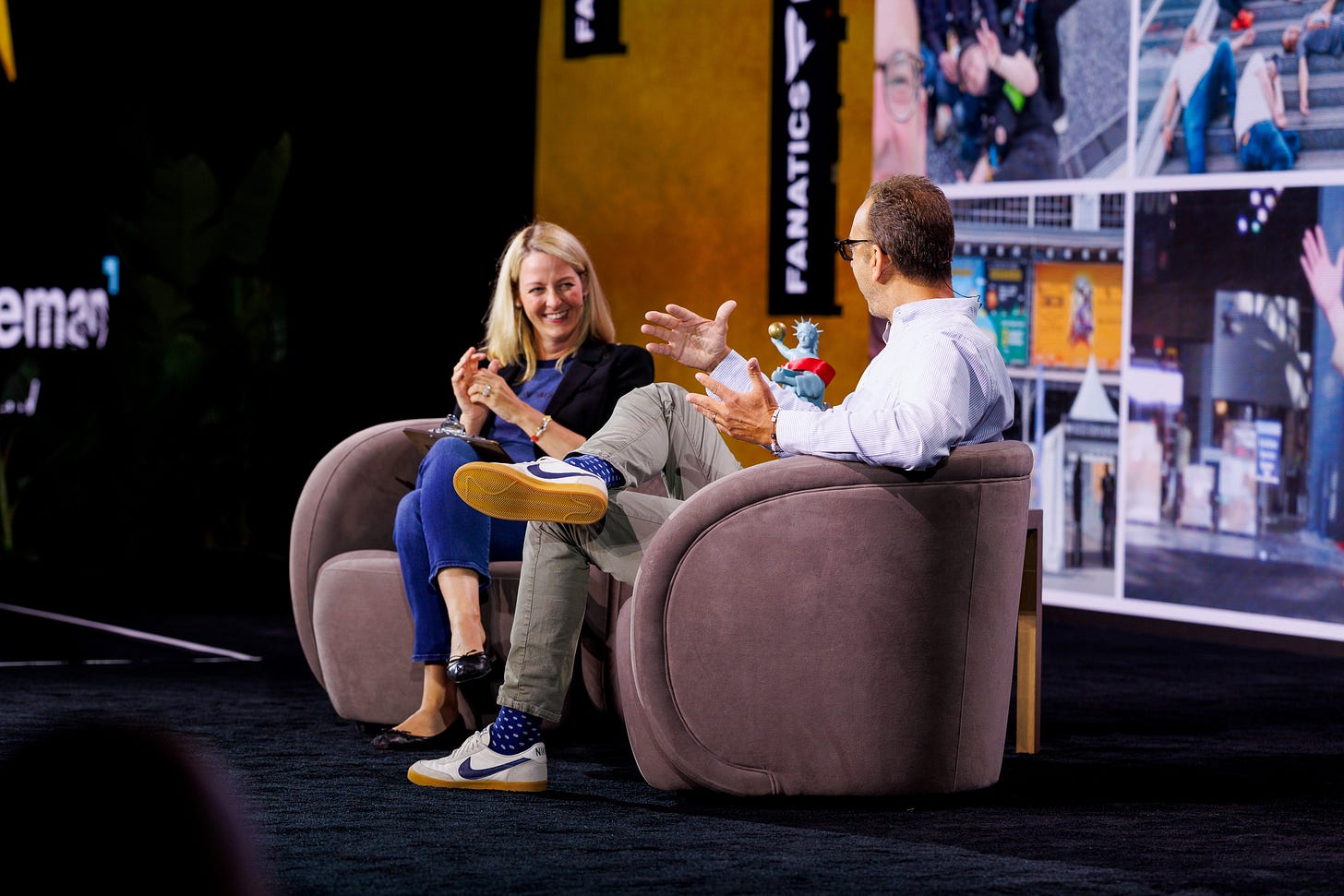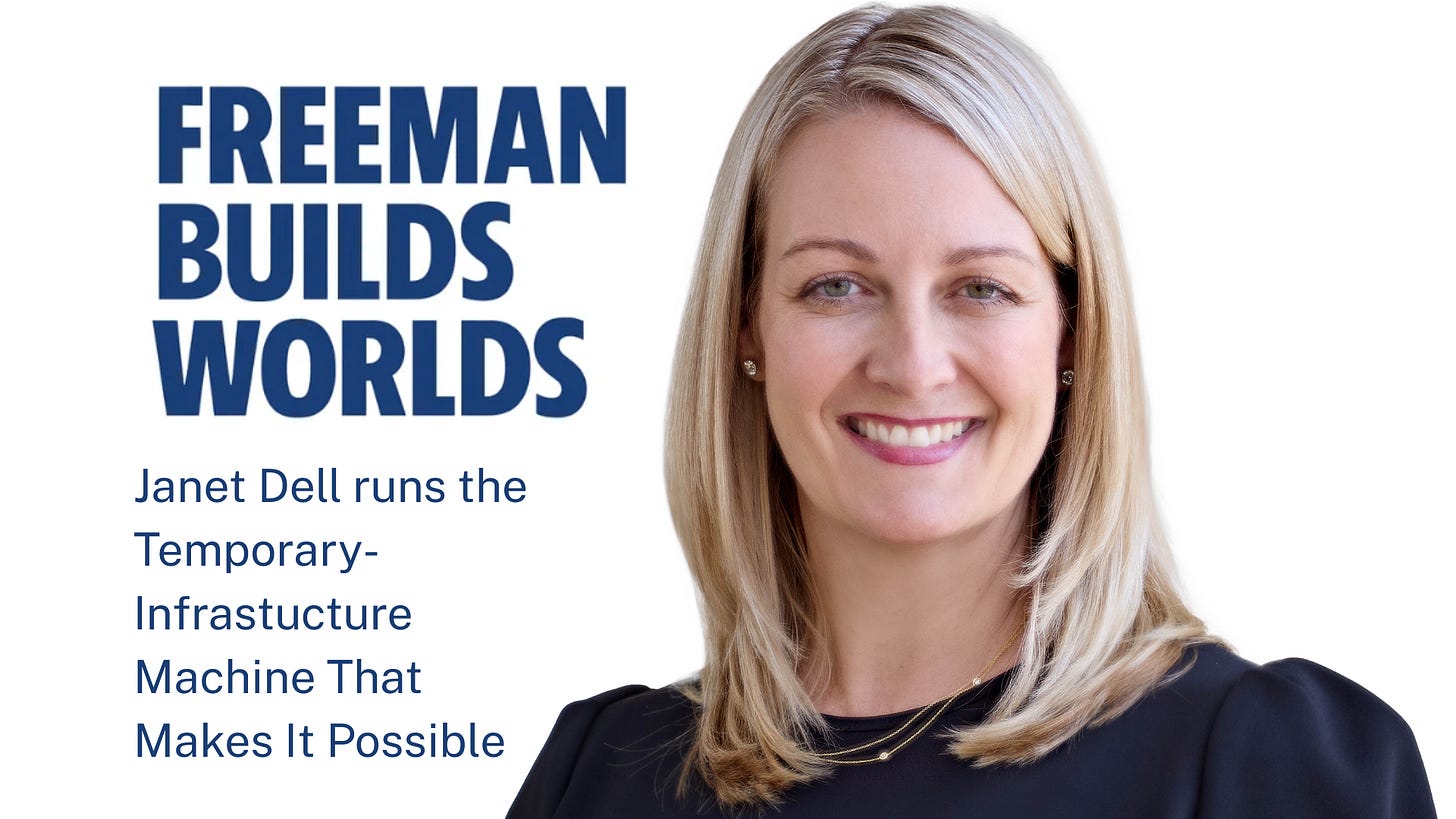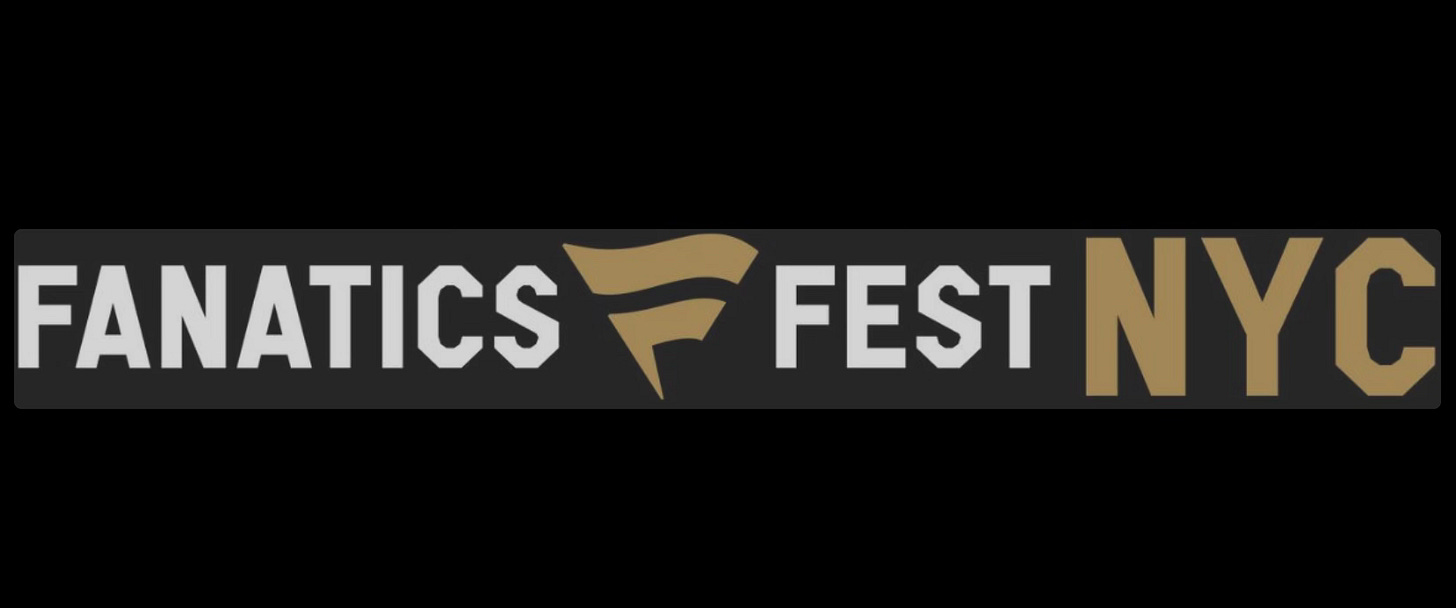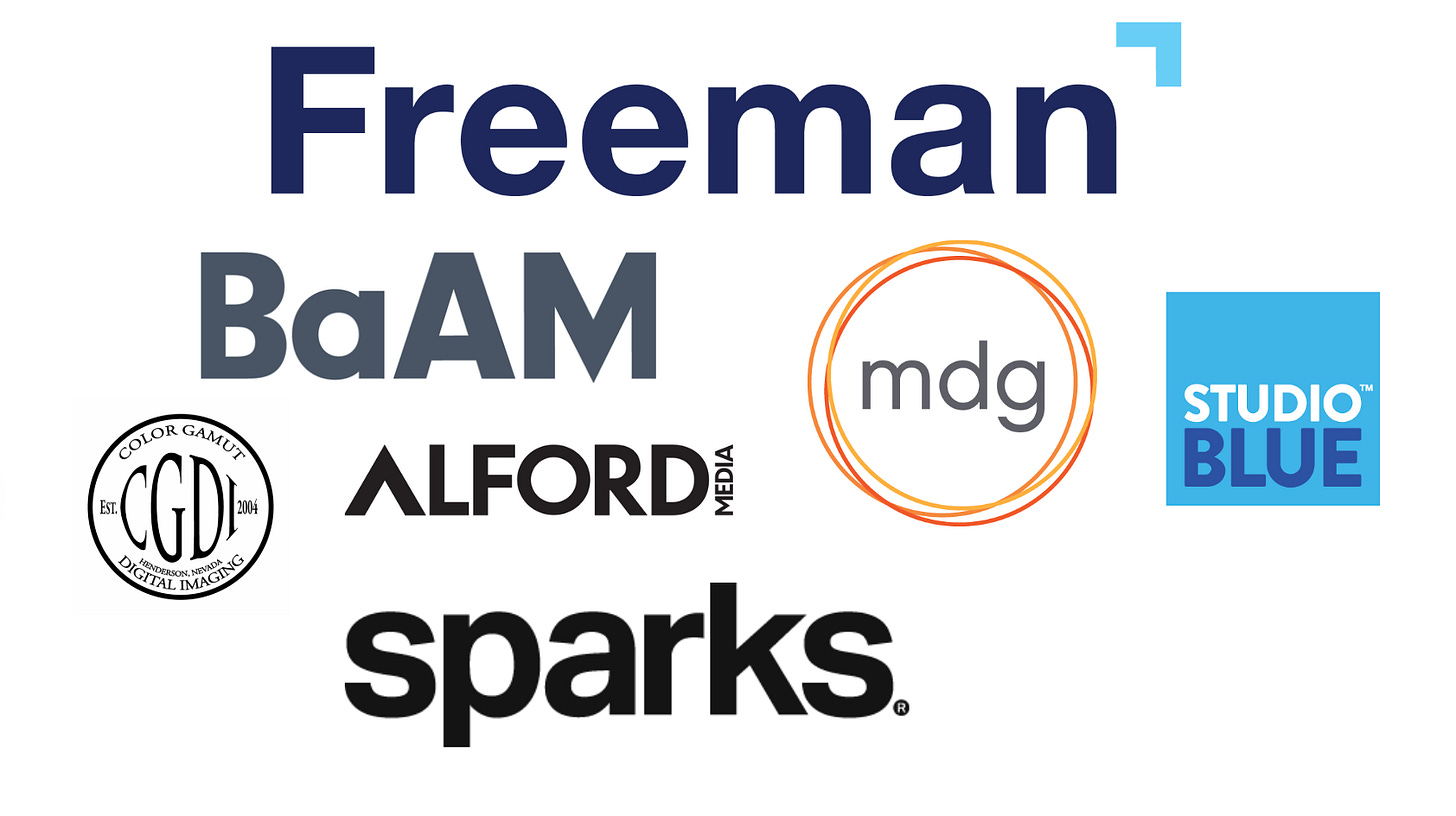Freeman Builds Worlds
Janet Dell runs the temporary-infrastructure machine that makes it possible.
Freeman doesn’t just put on events; it builds worlds from nothing. One weekend a Toronto parking lot becomes a stadium for Live Nation. The next, an Iowa cornfield is reborn as a “Field of Dreams” ballpark. A waterfront morphs into Fanatics Fest, part sports expo, part cultural carnival. The walls, the ceilings, the venue itself: none of it has to exist until Freeman crews arrive. They raise it, light it, wire it, and tear it down again in hours.
That duality is Freeman’s gift. It offers organizers the full spectrum of options, from the anchored reliability of convention centers to the audacity of no-walls, purpose-built spaces designed for a single moment. “You don’t need four walls and cement anymore,” says Janet Dell, the company’s chief executive. “There are so many new ways to bring people together.”
Freeman builds worlds. And Dell runs the machine that makes it possible. She doesn’t play showrunner so much as thermostat. She sets the temperature; everyone else performs.
Dell’s life has always looked like rehearsal for this role. She grew up in Minnesota, one of four children, in a family where accountability was non-negotiable. Her mother, the daughter of a military man, enforced discipline with drill-like precision. Holidays weren’t casual affairs; they were productions. “Christmas was an event,” Dell recalls. Her father, a Navy Vietnam vet, shared the prevailing views of his time and was realistic about the challenges she’d face in pursuing her career goals. She answered by doing it anyway.
By high school she was already the president-of-everything type — intense, determined, perhaps too serious. At the University of Wisconsin she studied finance to satisfy her father but found herself learning more in sorority leadership and philanthropy. She later admitted she was rigid then. The event industry would teach her the necessity of laughter and trust, of building pressure valves into pressure cookers.
Her first job, on a Chicago trading floor, was a crucible: eighty men, one woman, adrenaline in place of air. Consulting carried her abroad and taught her cultural nuance. But it was Marsh, where she spent nearly two decades, that crystallized her philosophy. Hired in the aftermath of 9/11, when the company had lost 800 employees, she realized something that never left her: “You can’t just bring the business back — you have to bring the people back.”
Motherhood reinforced the lesson. Three children, long commutes from Bernardsville into New York, and a pandemic that turned her kitchen into a command center convinced her that flexibility is not a perk but infrastructure. “I want Freeman to do better,” she says. “Flexibility matters. Empathy matters. People perform when they feel trusted.”

When Dell joined Freeman in 2018, its mission — connecting people in meaningful ways — felt inevitable to her. By 2020 she was president and COO; in 2024 she succeeded Bob Priest-Heck, one of the industry’s most respected figures, who had modernized the company without betraying its soul.
The scale she inherited is staggering. Freeman produces thousands of events every year: sprawling trade shows, corporate summits, fan festivals, and sports spectaculars. Its workforce numbers in the thousands, many of them military veterans, their ethic of discipline and accountability etched into the culture. The Freeman family’s legacy continues, with a strong and dedicated fourth generation and now a fifth, as the newest generation has just been born. They invest not only in Freeman but in the industry itself — working closely with associations, supporting community programs, and running Camp Buck, the in-house leadership retreat where employees are exposed to “the art of the possible” and Inside Live where clients are shown what lies backstage.
It is also a rare multi-generational workplace, spanning four or five generations at once, each with different expectations. For Dell, it’s both challenge and advantage: if you can make a show resonate for four generations of attendees, you can do the same for your own teams.
Her contribution has been to give the legacy a philosophy. She frames it simply: run a company the way you run an event. Events mobilize people around deadlines that cannot move. They collapse silos because the doors open whether marketing is ready or not. They generate serendipity — the unexpected handshake, the idea sparked in a hallway. They demand freshness; no one returns for last year’s show. And they follow a rhythm: anticipation, crescendo, closure, renewal.
Freeman had always lived this way instinctively. Dell gave it language — and in doing so, turned it into something more: a management model that others are beginning to adopt. In the wake of the pandemic, many organizations realized that their old metaphors — machines, networks, factories — no longer fit. Convening people, setting a cadence, creating experience, and iterating outcomes like an event does — that’s the playbook modern leaders are borrowing.
Dell admits she hadn’t thought of it in those exact words until it was pointed out, but recognized its truth. Freeman manages itself like its shows: it holds exchanges at every office and warehouse, gathers people to break bread, listens to feedback, and adapts. Even going to the office, she now says, can be seen as an “event” if managed with that ethos.
Layered onto that is the people-first leadership style she protects. She is quick to say she didn’t invent it — “that is the legacy of the Freeman family” — but she sees it as her responsibility to safeguard and evolve it. People-first, for Dell, doesn’t mean soft. It means empathy and trust, which she believes unlock “outsized performance,” paired with honesty and rigor, which ensure the standards never drop. “Being a good people-first leader is making sure people are getting honest feedback and real coaching to develop,” she explains. It’s not about being nice all the time. “You’re hugging them to get them to do something better.”
That balance — empathy and accountability — is why Freeman’s teams, when mobilized, still astonish her. “It blows my mind what they’re able to do,” she says. “You open the show doors, and then hours later it’s torn down and something new rises again. Don’t take it for granted. It’s amazing.”
The market has caught up to Freeman’s thesis. Corporate events have become revenue engines. Salesforce’s Dreamforce is
effectively a second balance sheet. IBM Think, CES, Fanatics Fest — commerce machines disguised as convenings. “Trust gets built in person,” Dell says. “Hundreds of millions in renewals and expansions happen because of what’s sparked at a live event.”
Freeman has expanded to meet that moment. Sparks and 3D Exhibits strengthens its corporate experiential muscle. BaAM builds the no-walls future, from Toronto stadiums to a ballpark in a cornfield to pop-up fan festivals. mdg brings precision to attendee acquisition; Tag Digital adds paid-media reach. Together, they shift Freeman upstream, into strategy, brand storytelling, and audience design, where the margins — and the impact — are stronger than forklifts and rigging.
Dell’s leadership cabinet resembles a festival lineup more than a boardroom. Ken Holsinger runs insights, mapping audience behavior and value. Kimberly Hardcastle-Geddes formerly of mdg and now with Freeman, brings audience strategy. Creative veterans stage the story. Dell conducts them like an executive producer, ensuring each act connects without losing individuality.
And then comes the frontier that most vividly explains what it means to say Freeman builds worlds: temporary infrastructure. The company can raise a stadium in a weekend, turn a pier into a conference hall, or transform a city block into a festival site. “It’s just more options,” Dell says. “And our creative teams love it — there are so many ways to bring people together.”
That’s Freeman’s defining advantage: it spans the entire spectrum, from the convention center’s anchored reliability to the radical freedom of no-walls builds designed for a single moment. Few companies can deliver both.
The implications are immense. Temporary infrastructure untethers gatherings from brick and mortar. It allows brands to build their own stages instead of renting someone else’s. It accelerates experimentation, each build a one-off laboratory. And it positions Freeman not as a service vendor but as cultural infrastructure — scaffolding for commerce and culture alike.
For Dell, it’s the natural extension of a life already staged like an event: childhood holidays run as productions, a sorority that taught balance, a trading floor that tested her steel, a 9/11 rebuild that made empathy central, a pandemic that proved flexibility essential. Now she leads a company that can raise cities and dismantle them overnight, mobilize thousands, and reinvent itself with every cycle.
Machines produce parts. Networks connect nodes. Events build worlds. Freeman builds worlds.
And Janet Dell is the operator of that vision — steadying the temperature, protecting the people-first culture, and showing that the event model is not just Freeman’s secret, but a new philosophy of management for the modern age.





